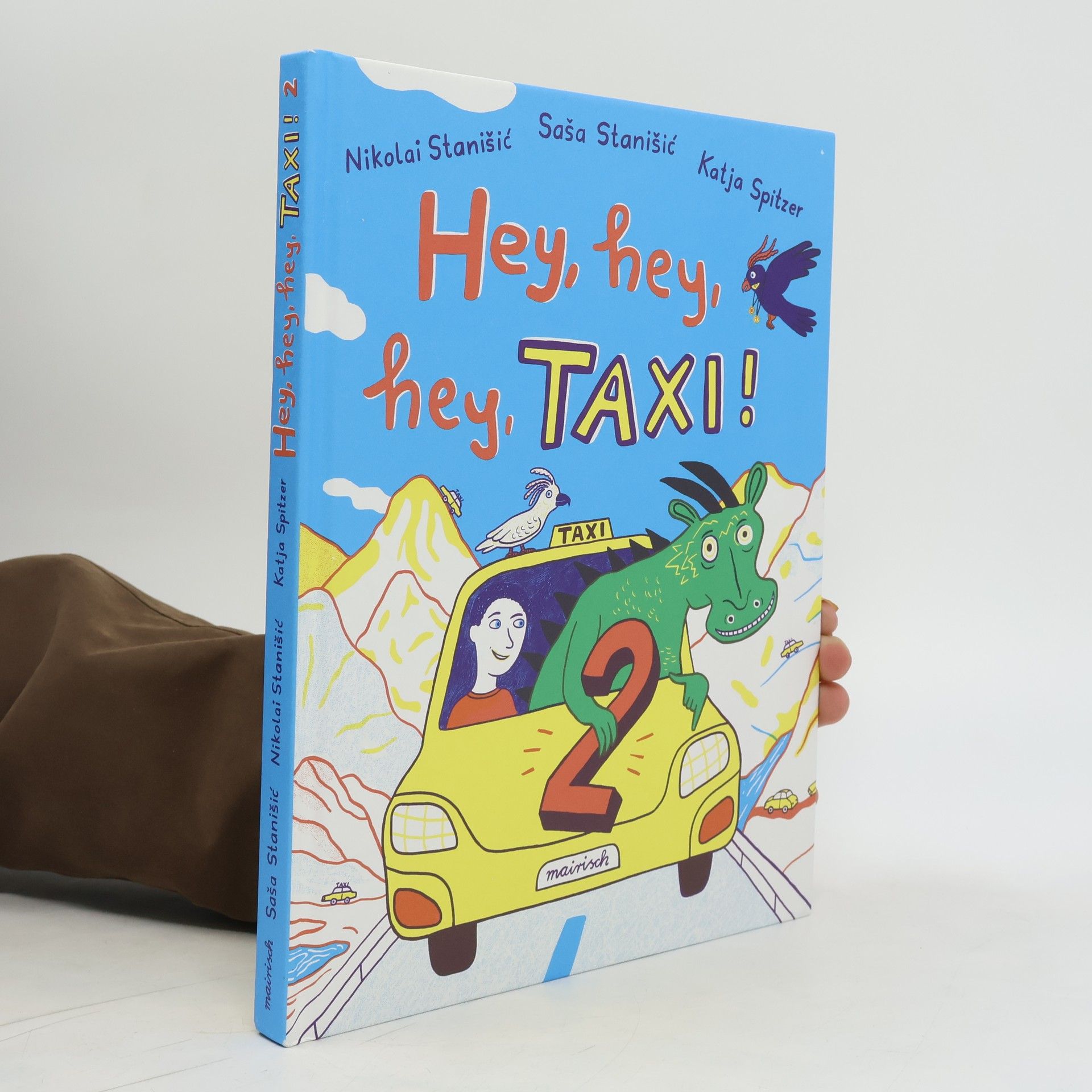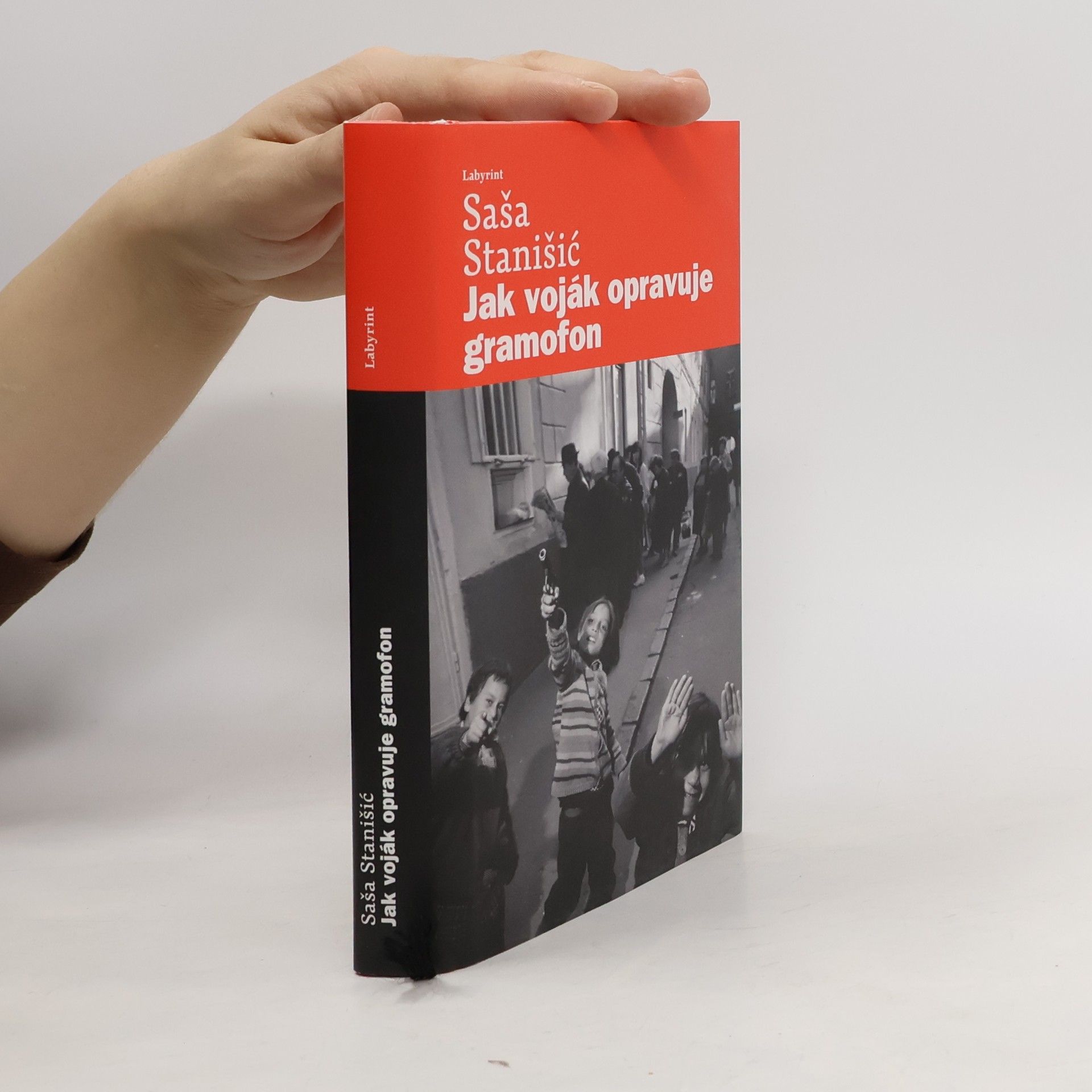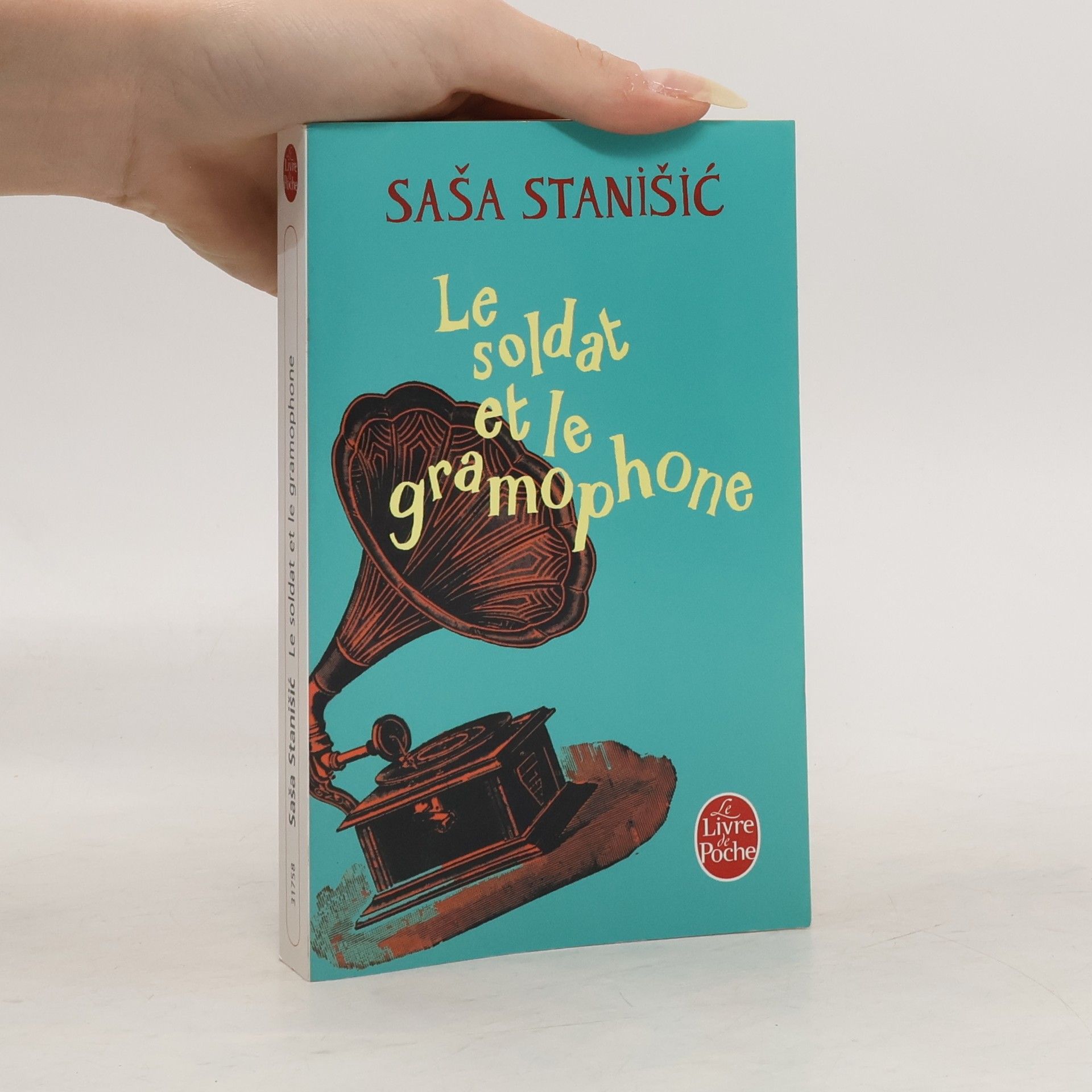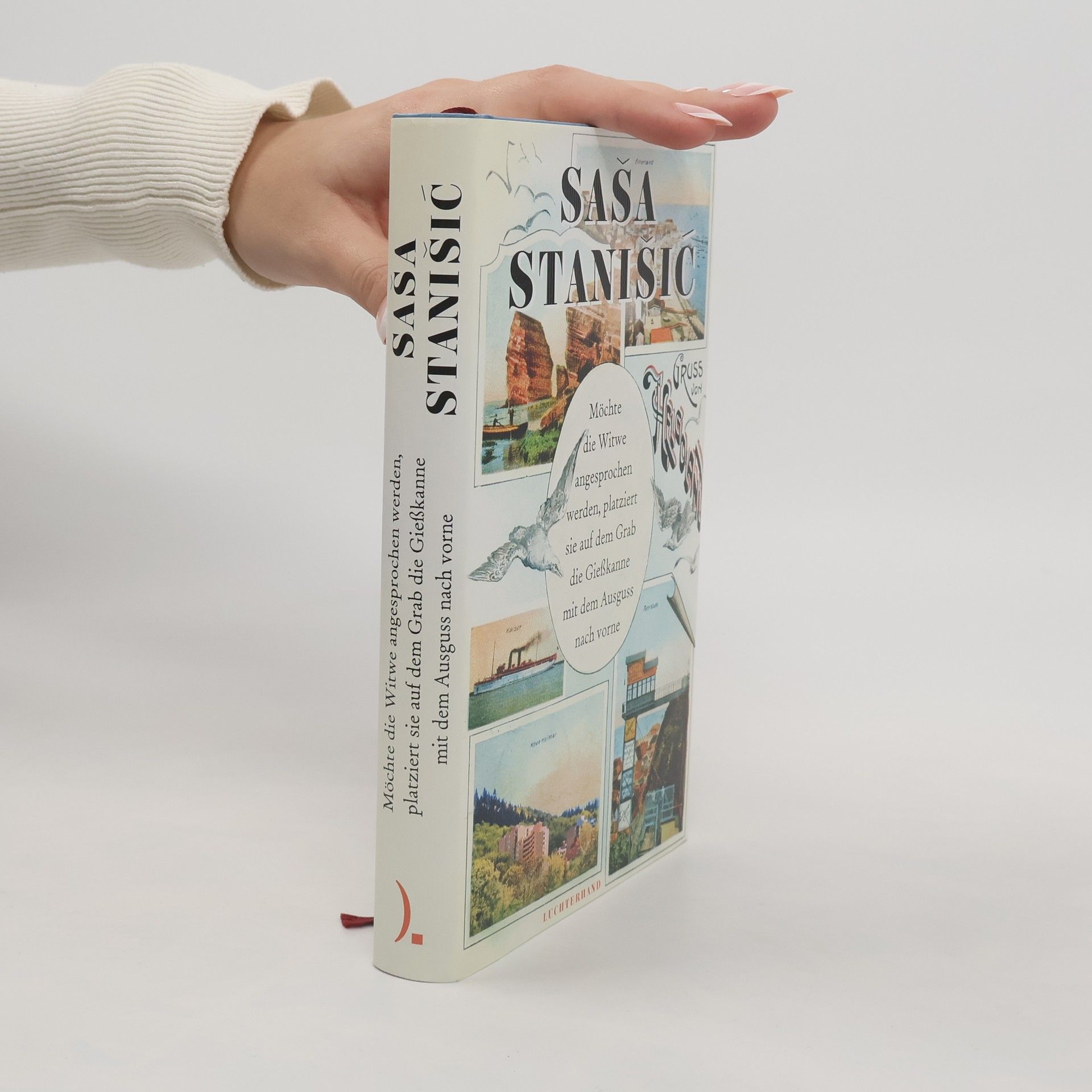Aleksandar vyrůstá v malém bosenském městě Višegrad a jeho největším darem je schopnost čarovat a vyprávět příběhy. Místní obyvatelé mu k tomu dávají dost podnětů, podobně jako členové vlastní rodiny: dědeček Slavko na stranických schůzích cituje pohádku o Červené karkulce, teta Tajfun se podobá přírodní katastrofě, prababička miluje americké westerny a tasí vidličku rychleji než voják pistoli, maminka pracuje jako politická poradkyně… Burleskní a tragikomický román o výjimečném dětství v časech, kdy člověk usíná v míru a probouzí se do války, o brutální ztrátě důvěrného světa, ale i o nezlomné víře v sílu vyprávění. Kniha plyne jako troufalá řeka Drina, kterou se malý Aleksandar kdysi pokusil přeplavat.
Saša Stanišić Knihy






Noc před oslavou
- 296 stránek
- 11 hodin čtení
Je noc před oslavou kdesi na venkově. Všichni spí. Až na převozníka – ten je mrtvý. A na starou malířku, která se rozhodne poprvé v životě zachytit vesnici v noci. A zvoníka, jenž míří na kostelní věž, kde zjistí malý problém: zvony jsou pryč. K vesnici se krade liška, slídící po vejcích pro svoje mladé, a nocí se řítí bývalý podplukovník lidové armády v mylné naději, že objeví víc důvodů žít než kouřit. A navíc se kdosi vloupal do obecního archivu. Nic se neztratilo, ale vesnicí se začínají šířit zvěsti… Staré příběhy, pověsti a pohádky se pozvolna vlévají do domů a prosakují do snů spících obyvatel. Vzniká tak román jedné dlouhé noci, mozaika života na vsi, kde se setkávají starousedlíci s náplavou, zesnulí s živými, dělníci a důchodci se vznešenými zloději ve fotbalových dresech. Ti všichni chtějí něco dokončit, v té jedné noci před oslavou…
Where You Come from
- 364 stránek
- 13 hodin čtení
In August, 1992, a boy and his mother flee the war in Yugoslavia and arrive in Germany. Six months later, the boy’s father joins them, bringing a brown suitcase, insomnia, and a scar on his thigh. Saša Stanišic’s Where You Come From is a novel about this family, whose world is uprooted and remade by war: their history, their life before the conflict, and the years that followed their escape as they created a new life in a new country. Blending autofiction, fable, and choose-your-own-adventure, Where You Come From is set in a village where only thirteen people remain, in lost and made-up memories, in coincidences, in choices, and in a dragons’ den. Translated by Damion Searls, it’s a novel about homelands, both remembered and imagined, lost and found. A book that playfully twists form and genre with wit and heart to explore questions that lie inside all of us: about language and shame, about arrival and making it just in time, about luck and death, about what role our origins and memories play in our lives.
Hey, Hey, Hey, Taxi!
- 96 stránek
- 4 hodiny čtení
Ein Taxi ist für ein Kind ein magisches Vehikel. Ein Hexenbesen auf vier Rädern. Du steigst ein und das Taxi erfüllt dir deinen Reisewunsch. Was, wenn die Magie noch weiter reichte? Wenn Taxis Geschichten anlockten, phantastische und absurde Geschichten, lustige Geschichten, bevölkert von Mensch und Tier und Riese und Piratenkapitän mit vier Piratenkapitänsmützen? Wenn Taxis also Einfallstore wären für die Fantasie der Kinder? So ein Buch ist das hier: Eines, in dem ein Ich in ein Taxi steigt und damit eine Welt betritt, in der ganz eigene, unwahrscheinliche Gesetze herrschen. Die Reisen führen in alle Richtungen, nach nebenan und in die Zeit und ins All. Aber am Ende immer zurück nach Hause, zurück zum Kind. Sasa Stanisic hat sein erstes Kinderbuch geschrieben - zusammen mit seinem Sohn! Ein großer Spaß - als Vorlesegeschichten vorm Einschlafen fast schon zu aufregend! Gelesen vom Autor
Ein schönes Ausländerkind
- 208 stránek
- 8 hodin čtení
Der Debütroman von Toxische Pommes: »Diese Geschichten sind Pointen der Rührung, des Absurden, der politischen Erzählung. Und als Gesamtbild ein großes Glück.« Saša Stanišić »Was hat uns das neue Leben gekostet? Meinen Vater seine Stimme, meine Mutter ihre Lebendigkeit. Und mich?« Vor dem Krieg in Jugoslawien flüchtet die Familie in ein Einwanderungsland, das keines sein möchte. Dieses Buch erzählt von der Beziehung zwischen einer Tochter, deren einziger Lebenssinn darin besteht, die perfekte Migrantin zu werden, und ihrem Vater, der sich bei dem Versuch, ihr das zu ermöglichen, selbst verliert. Erstmals gibt es die großartig lakonische Toxische Pommes in Romanform. Seit der Corona-Pandemie ist sie in den sozialen Medien mit satirischen Kurzvideos über die schönen und hässlichen Seiten der Gesellschaft erfolgreich, und seit kurzem steht sie mit ihrem Kabarettprogramm auch auf den analogen Bühnen.
Hey, hey, hey, Taxi! 2
- 88 stránek
- 4 hodiny čtení
Saša Stanišić und sein Sohn Nikolai erzählen aufregende Geschichten über verrückte Taxis und ihre Abenteuer. Von rasanten Verfolgungsjagden bis hin zu kreativen Träumen wird auch die Bedeutung von Freundschaft und Individualität thematisiert. Illustriert von Katja Spitzer ist dieses Buch für Kinder ab 6 Jahren geeignet.
Wolf
- 192 stránek
- 7 hodin čtení
Saša Stanišićs erster Kinderroman macht Mut zum Anderssein - Ausgezeichnet mit dem Deutschen Jugendliteraturpreis 2024! Kemi wird im Ferienlager Teil einer Gruppe unterschiedlichster Jugendlicher und Betreuer. Und er trifft auf Jörg, der irgendwie andersiger ist, für den sich Kemi aber sehr interessiert. Er beobachtet genau, was die anderen mit Jörg machen und wie in der Gruppe langsam alles eskaliert. Wie weit? In seinen Träumen begegnet Kemi einem Wolf, seiner eigenen Angst. Er lernt, mit dem Wolf zu leben und mutig zu sein. WOLF ist ein meisterhaft beobachtender Kinderroman darüber, wie schmal der Grat zwischen Anderssein und Ausgrenzung ist. thematisiert Mobbing unter Jugendlichen ein Buch über Freundschaft, Empathie und Charakterbildung grandios erzählt vom vielfach preisgekrönten Bestseller-Autor Saša Stanišić Aktuell: Ausgezeichnet von Stiftung Buchkunst als "Schönstes Buch 2024" Kategorie Kinderbuch SPIEGEL Bestseller Juni 2024 Ausgezeichnet als "Hörbuch des Monats" August 23 (von der Deutschen Akademie für Kinder- und Jugendliteratur) Shortlist des Literaturpreises "Der Vielfalter - für Diversität im Kinder- und Jugendbuch 2023" Ausgezeichnet mit dem "Leselotse" Juni 2023 (Börsenblatt) Ausgezeichnet mit "Die besten 7 Kinder- und Jugendbücher" Juni 2023 (Deutschlandfunk)
Panda-Pand
Wie die Pandas mal Musik zum Frühstück hatten
Pandabär Nicht-Peter knabbert beim Frühstück genüsslich an einem Bambusrohr – und hat die beste Panda-Idee aller Zeiten! Er pustet kräftig in sein Lieblingsessen. Was kommt heraus? Erst ein Ton, dann zwei und schließlich die schönste Melodie der Welt.Aber so ganz allein macht das Musizieren keinen Spaß. Also startet er mit seinen Freunden eine Panda-Pand. Damit ist die Langeweile-Pandamie vergessen. Und der Konzerttermin steht. Die Frage ist nur: So viele Pandas mit Bambusflöten, ob das gutgehen kann? Die riechen doch so lecker …
Le Livre de Poche: Le soldat et le gramophone
- 448 stránek
- 16 hodin čtení
Aleksandar vit près de Visegrad, dans l’ex-Yougoslavie, lorsque son grand-père, dont les récits légendaires l’ont enchanté, meurt. Il fait le serment de transformer la réalité en histoires... Mais la guerre est proche. Viendra le temps de l’exil et d’une intégration difficile dans l’Allemagne des années 1990, obsédée par le productivisme et le coût de la réunification. Premier roman. »
Was wäre, wenn man nicht diese eine Entscheidung getroffen hätte, sondern jene andere? Was wäre, hätte man der Erwartung getrotzt? Und dann ist da trotzdem die Furcht, feige gewesen zu sein, zu lange gezögert und etwas verpasst zu haben, ein besseres Ich, ein größeres Glück, die lustigeren Haustiere und Partner. Saša Stanišić führt uns an Orte, an denen das auf einmal möglich ist: den schwierigeren Weg zu gehen, eine unübliche Wahl zu treffen oder die eine gute Lüge auszusprechen. So wie die Reinigungskraft, die beschließt, mit einer Bürste aus Ziegenhaar in der Hand, endlich auch das Leben in die eigenen Hände zu nehmen. So wie der Justiziar, der bereit ist zu betrügen, um endlich gegen seinen achtjährigen Sohn im Memory zu gewinnen. Und so wie der deutsch-bosnische Schriftsteller, der zum ersten Mal nach Helgoland reist, nur um dort festzustellen, dass er schon einmal auf Helgoland gewesen ist. Am besten wäre ja, man könnte ein Leben probeweise erfahren, bevor man es wirklich lebt.



